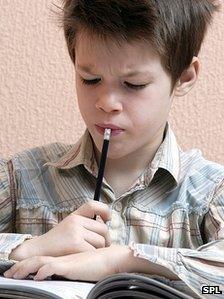Children claim alcohol intake of 28 units a week
- Published
- comments
Former teenage drinker Sam McDermott and Dr David Regis, author of the report, discuss the effects of drinking from a young age
A small number of children as young as 12 claimed they drank the equivalent of 19 glasses of wine a week when questioned for a health survey.
Research by the independent Schools Health Education Unit suggested that 4% of those questioned aged 12 or 13 claimed they drank 28 units or more.
However, the overall trend in the survey of almost 84,000 youngsters was for fewer to be drinking and smoking.
The government says it is cracking down on those who sell alcohol to children.
The data was collected from 1,100 primary and secondary schools across the UK, covering 83,724 youngsters between the ages of 10 and 15.
They were asked more than 100 health-related behaviour questions on what they do at home, at school, and with their friends.
Dr David Regis from SHUE said the poll painted a mixed picture of young people's attitudes to drink.
"When we're looking at the alcohol figures there's good and bad news in there at the same time," he told the BBC.
"We've got an increasing number of pupils who are saying as far as they're concerned, alcohol is not for them at all, so the number of teetotallers has been going up in recent years, but we've also seen those youngsters that do drink maybe more likely than ever to go over the top."
A Department of Health spokesman said its drug strategy included measures to prevent alcohol misuse by young people.
"Children under 15 shouldn't be drinking at all," he said.
"We are... doubling the maximum fine for under-age alcohol sales to £20,000 and extending the period of voluntary closure that can be given as an alternative to prosecution for persistent under-age selling from 48 hours to two weeks."
'Specialist support'
Data collected from pupils in years six, eight and 10 indicated that 11% of year 10 pupils - aged 14 to 15 - drank more than 10 units of alcohol in the week before the survey.
However, fewer children said they had been drunk in the preceding week than in previous surveys.
Three units equates to two small (125ml) glasses of wine (containing 12% of alcohol by volume) or a whole pint of strong lager (5% ABV) or cider, according to the advice charity Drinkaware.
Simon Antrobus, chief executive of drug and alcohol rehabilitation charity Addaction, said the figures confirmed its workers' experiences.

Just 3% of those surveyed said they had spent two hours doing homework the previous day
"Children who drink at younger ages are the ones who need help most. We also know that children whose parents misuse alcohol are more likely to develop their own problems later in life," he said.
Just over half of those aged 14 or 15 said they had never tried cigarettes, while 95% of 10- and 11-year-olds said they had never smoked.
Cannabis was the most tried drug by year 10 pupils, with 15% of the boys saying they had taken it. However, a very small percentage had tried other drugs such as heroin, cocaine, ecstasy and crack.
One in 10 of the age group had mixed drugs and alcohol at the same time.
The results also raised concerns that some youngsters are not getting enough sleep, with almost half of year 10 girls admitting they did not get enough to stay alert at school. Some 41% of boys said the same.
Almost a quarter of boys in years eight and 10 spent more than two hours playing computer games the day before they were surveyed, while one in seven pupils in the same year groups said they had spent more than two hours watching TV.
Skipping breakfast
But only 3% said they spent this amount of time on homework, with 36% saying they spent no time at all on it, and 41% saying their homework took up to 30 minutes.
The report found more than a third of girls aged 10 to 11 would like to lose weight, with two-thirds of year 10 girls saying the same.
A third of the latter group had skipped breakfast that day, with 24% saying they had not eaten lunch on the previous day.
A third of girls aged 10 to 11, and 29% of those aged 12 to 13, said they were afraid of going to school because of bullying at least sometimes.
And while 6% of boys aged 14 to 15 said others may fear going to school because of bullies, 10% admitted they had bullied someone in the previous year.
The teenagers were also asked whether they ever carried weapons for protection. Of the Year 10 boys, 18% said they may carry a weapon, with 5% of these always carrying one.
- Published28 July 2011
- Published17 June 2011